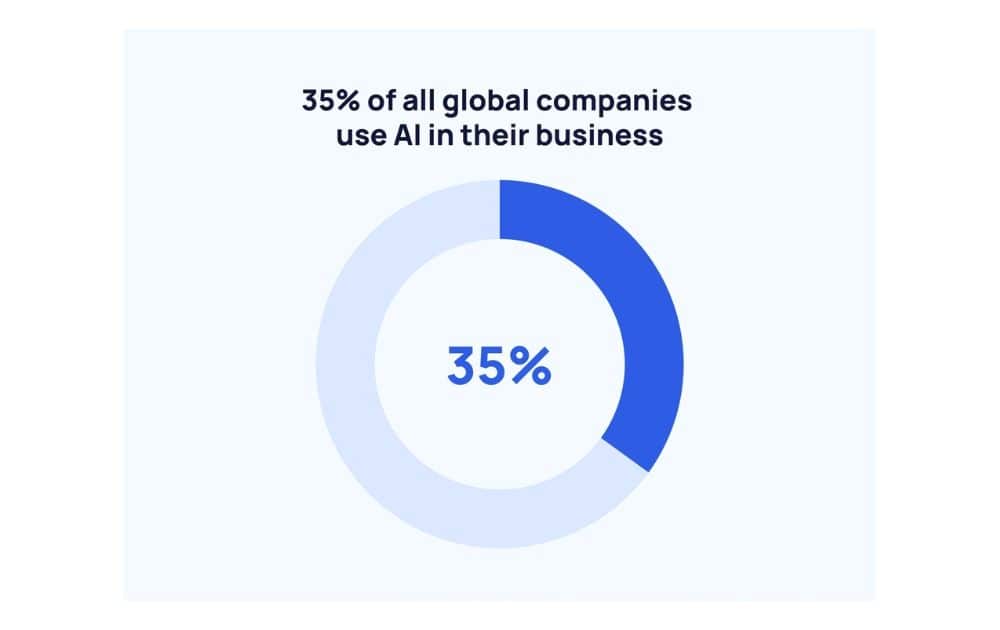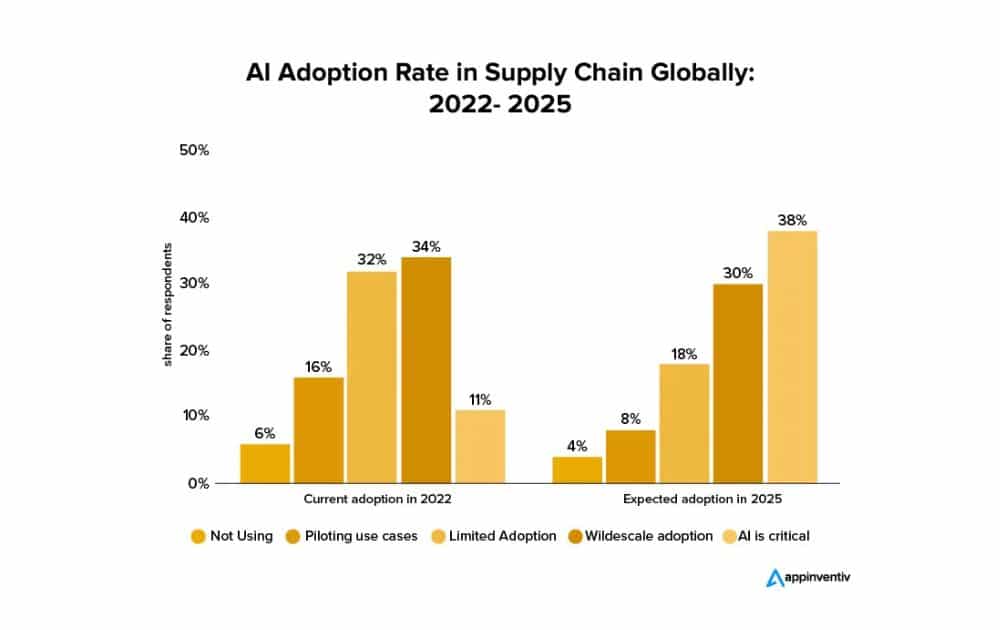AI trends are intricately weaving their way through every industry, with ecommerce standing out as a prime example of this technological integration.
If you’re exploring how to use artificial intelligence for your ecommerce business, you’re definitely on the right track. After all, data shows that 35% of companies on a global scale use AI in their business.

With more and more people witnessing how AI can streamline processes and boost operations, the growth of artificial intelligence in ecommerce is only expected to significantly increase in the coming years.
Whether you’re a veteran in the online marketplace or setting up shop for the first time, understanding and embracing these trends in AI can propel your business into a future where every interaction is tailored and every process is efficient.
Current Trends in AI That Are Shaping E-commerce
Here are a few of the current AI trends to explore if you’re a seller looking to grow your business with the help of AI.
Personalization
AI-driven personalization tailors the shopping experience to each customer, leveraging data to recommend products, customize searches, and create targeted marketing.
In a survey asking global business leaders about the metrics they use to gauge the success of AI-driven personalization efforts, 47% highlighted the precision of data as the top priority.

Closely on its heels, 44% pointed to the importance of real-time data velocity and the rate of customer retention or repeated transactions as key measures. Furthermore, 42% considered the ability to save time for the business as a significant marker of effectiveness.
Real-World Example: Netflix’s Recommendations
Netflix’s recommendation engine is a classic example of personalization as one of the top AI trends. The streaming platform’s algorithm adjusts recommendations based on previous titles searched or viewed by the user.
This approach ensures that each viewer’s homepage is uniquely tailored, promoting titles that closely align with their individual preferences and viewing history.
By analyzing vast amounts of data―including watch times, pauses, and searches―Netflix can predict what a user is likely to enjoy next with remarkable accuracy.
AI Tools for Sellers
Automated Customer Service
AI customer service is one of the AI market trends that augment a small business’s ability to provide quality service without having to spend a small fortune.
AI chatbots and virtual assistants can provide 24/7 customer support, handle inquiries, and solve problems efficiently. This capability is extremely valuable in today’s fast-paced world, where consumers expect quick and convenient responses to their questions and issues.
Real-World Example: Sephora’s Chatbot
Sephora’s chatbot, accessible through the company’s website and mobile app, offers beauty advice and product recommendations.
The chatbot uses NLP tech to understand customer inquiries and respond to them with relevant answers. These may include information about product types, makeup recommendations, and other matters.
It’s all tailored to the user’s needs, preferences, and, if available, previous shopping behavior.
AI Tools for Sellers
Inventory and Supply Chain Management
Inventory and supply chain management can be one of the most useful AI trends to date.
AI can forecast demand, optimize stock levels, and manage supply chain logistics, reducing waste and improving efficiency.
Data from McKinsey & Company notes that AI-based supply chain management solutions are anticipated to be transformative tools for organizations facing various challenges.

This is due to AI’s capacity to sift through large data sets, discern patterns, enhance operational transparency, and facilitate improved decision-making.
Real-World Example: Amazon’s Third-Party Inventory Forecasting
There are AI-driven forecasting tools you can integrate with Amazon’s inventory management tools, which offer advanced inventory forecasting.
Tools like Inventoro, for instance, help sellers access data about sales trends, market dynamics, and other factors to predict future inventory needs more accurately.
These tools can integrate with Amazon Seller Central to offer more comprehensive forecasting and inventory management capabilities.
AI Tools for Sellers
AI-Powered Marketing
AI marketing trends are constantly evolving to offer more sophisticated ways to reach and engage with target audiences. With AI being able to sift through and analyze vast amounts of customer data, it’s not surprising that many ventures are exploring the use of AI in digital marketing.
One of the ways AI helps marketers is through automatic audience segmentation. For instance, you can use AI to analyze customer data and identify distinct segments based on purchasing behavior, interests, and other criteria.
You can also use AI to test different messages and channels, learning what works best and refining your approach accordingly.
Real-World Example: ClickUp’s Email Generator
ClickUp offers an AI email marketing tool that can streamline the creation, management, and optimization of email campaigns. The platform uses AI to quickly generate email content, including subject lines and body text, tailored to engage your audience effectively.
In addition, ClickUp’s automation and integration features, alongside partnerships with platforms like Mailchimp, facilitate seamless campaign execution and performance tracking, allowing marketers to focus on strategy over repetitive tasks.
With AI trends focused on personalization, some AI email marketing tools also offer individualized send times. AI identifies the best time to send emails to each recipient depending on when they’re most likely to check their inbox.
AI Tools for Sellers
Visual Search and Image Recognition
Visual search and image recognition are among the latest trends in AI, revolutionizing the way customers interact with e-commerce platforms.
As one of the AI trends that offer shopping efficiency, this tool enables shoppers to upload an image and search for similar or related products, streamlining the discovery process.
Visual search and image recognition allow shoppers to save time and enhance user experience, which is among the top benefits of artificial intelligence in ecommerce.
Real-World Example: Amazon Visual Search
Amazon Visual Search serves as a prime example of AI trends, particularly AI applications in ecommerce.
This feature, embedded within the Amazon app, allows users to simply take a photo or upload an image of an item they are interested in. Then Amazon’s AI algorithms swiftly analyze the visual data to find similar or identical products available on its platform.

This is among the AI trends that help deliver accurate results to the user by interpreting visual cues, such as colors, shapes, styles, and even brand logos.
AI Tools for Sellers
Voice Search and Shopping
Voice search and shopping represent a pivotal shift in AI trends. As smart speakers and voice assistants become more ubiquitous, the use of artificial intelligence in ecommerce to facilitate shopping through voice commands is expanding rapidly.
To leverage these AI industry trends, it’s best to optimize their product listings for voice queries. Doing so involves incorporating natural language phrases and question-based keywords that mirror how people naturally speak.
Such optimization not only caters to the technological advancements in AI but also enhances the user experience by aligning with a natural, conversational tone.
Real-World Example: Domino’s Order-Taking via Alexa
Domino’s has capitalized on this AI trend by enabling customers to order pizza via Alexa. This is one of the most practical examples of artificial intelligence in ecommerce.
By using this technology, Domino’s allows customers to place orders effortlessly using simple voice commands. This innovation shows a vital stride in the use of AI in ecommerce, offering a glimpse into the future of consumer interactions with brands.
AI Tools for Sellers
Augmented Reality (AR) Shopping
This technology merges the physical and digital worlds, providing a virtual overlay of digital information onto the real world. AR offers a transformative approach to online shopping by allowing customers to visualize products in their own environment before making a purchase.
Unlike virtual reality (VR), which creates a fully immersive digital environment, AR enhances the reality you currently perceive, making it a powerful tool for enhancing customer confidence and satisfaction with their purchase decisions.
Real-World Example: Perfect Corp’s Virtual Makeup Try-On
Perfect Corp’s Virtual Makeup Try-On is a standout example of how AR technology is being applied in the beauty industry to revolutionize the shopping experience. This solution allows users to virtually apply makeup products using a real-time image or video of themselves.
This immersive experience enables customers to see how products will look on their unique features before making a purchase decision.
AI Tools for Sellers
The Lowdown
The role of artificial intelligence in transforming how sellers operate and engage with customers cannot be overstated. AI trends are setting new standards for efficiency, personalization, and innovation, offering ecommerce vendors a competitive edge.
For sellers, staying abreast of the latest trends and using AI in ecommerce is paramount. By doing so, you can be well-positioned to navigate the digital age and capitalize on its wealth of opportunities.
Author




